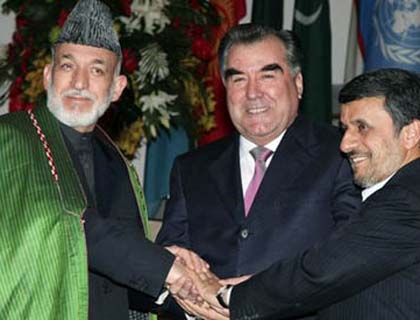Following the two-day long Regional Economic Cooperation Conference on Afghanistan (RECCA) in Dushanbe, the United Nations' security General Ban-ki-moon uttered that as security transition accelerates, the regional engagement becomes far vital for future economic and political stability in Afghanistan. "Economic cooperation is basic to laying the foundation for a secure future. A stable security environment is also essential if development is to take root," Mr. Ban Ki-moon said in message delivered on his behalf by his special representative to Tajikistan, Jan Kubis.
The regional agreement is not a new issue rather has long been one of the topics at the core of political and civil discussions in the country. Experts and socio-political activists have put down and assessed it from different angles. In brief and general view, it can be understood that all Afghan analysts and political officials are somehow in consensus that neighboring countries play key role in the country whether positive or negative. The history provides clear example for the claim.
Without going far and assessing the issue deeper in the heart of history, putting a brief glimpse to social and political situation in past several decades, the importance of neighboring countries can be inferred. Their role has been far bold in the last four decades.
They have been directly or indirectly engaged in the political issues and violent struggle for political power. Perhaps, it is largely believed that if Afghan Jihadi groups left alone, they would not have turned their arms against one another. Their interference in order to shape the political establishment in accordance to their own national interests led the country into a dangerous chaos and instability. Hundreds of thousands of people were killed and injured, and millions were forced to take refuge, particular to the two bigger neighboring countries, Pakistan and Iran. Due to chronic instability, it is assumed that around four million Afghan still stay in Pakistan and Iran.
Meanwhile, our neighbors did not have shared interest in the country. Iran as key player in the country, from the very start of its Islamic revolution has been deeply engaged in preaching a particular of Islamic interpretation. It has tried to preach Shiism, however bluntly failed. Therefore, during Taliban regime which was deemed to preach Wahabism, a radical interpretation, it did not recognize it. Instead, Tehran tried every option to weaken it, because it deemed Taliban regime as a dangerous foe in the region. Taliban, in freaking measure, killed around 15 employees of Iran's embassy in Mazar-e-Sharif. Following the incident, Tehran made several drills in order to attack Afghanistan in revenge.
The reports released by some officials show that top political and military officials supported the notion to attack Taliban regime, but ultimately Iranian supreme leader Ayatollah Ali Khaminae did not issue the command. Indeed he was the person that prevented the start of a consequential war.
On other hand, Islamabad had close links with the so-called Emarat-e-Islami and was of the few countries that recognized the regime. Indeed, some top Pakistani officials vividly express that Taliban was found by Islamabad in order to fill the power gap in Kabul. According to their mentality, after expulsion of red army, Jihadi groups turned against one another which proved disastrous for Pakistan. Millions of Afghans poured into the country and imposed millions of dollars on the shoulder of public and private sectors. Moreover, security crisis and political instability in Afghanistan fuelled social chaos and political turmoil in Pakistan too.
First of all, those groups failed to win over its rival groups generally retreated to Pakistan in order to revitalize and re-launch attacks inside the country. And secondly, almost all of them attracted attention of particular groups inside Pakistan and finally established deep-rooted front there.
So, as the instability spiraled on, the competition among supporters of particular Afghan armed groups turned tense. In such situation, Islamabad had not choice ahead other then involving itself somehow directly in order to solve challenges created due to lack of central power.
Fundamental contrasting view about Taliban regime further led into stoking rivalry between Tehran and Islamabad. Both tried to appoint a friendly establishment in Kabul, where Islamabad apparently won the game.
Moreover, our neighbors share common cultural, religious and lingual characteristics with different ethnic groups in the country. And through this linkage, they during long-lasting history have exerted influence. The religious, lingual and communal differences in the county have been major issues in defining the structure as well as the destiny of politics and political establishment in Kabul.
Our neighbors—Pakistan and Iran—have their own problems with each other. During past few decades, they always have had problem with each other. If currently their relations have convenient picture as well as prospective is largely due to presence of US in Afghanistan. The United States is powerful and Tehran tries all option to challenge its presence in the country. Similarly, Washington-Islamabad relation is not at good standing at all, particularly during past few years.
Now, if we see both closely cooperating with each other perhaps is to common goal—US should get out of the Afghanistan which provide to chance affect the political structure of the country.
Now the question is this that UN secretary general for great regional cooperation, is there any guarantee that neighboring countries after the completion of military withdrawal work in parallel to one another or not. In another, is there any guarantee their lasting rivalry would not deteriorate the security situation here? Of course, it is hard to believe. The only thing that our neighbors if kindly bestow us would be to just end to their interference. Because without interference of powers in region, Afghan may finally find a solution to their own problems.

